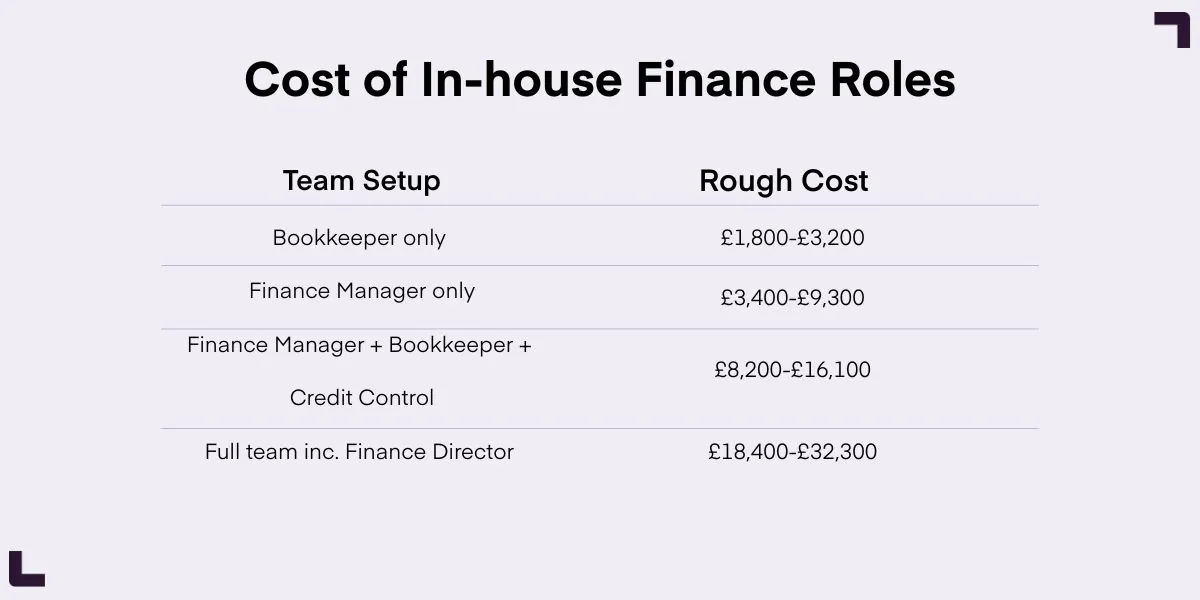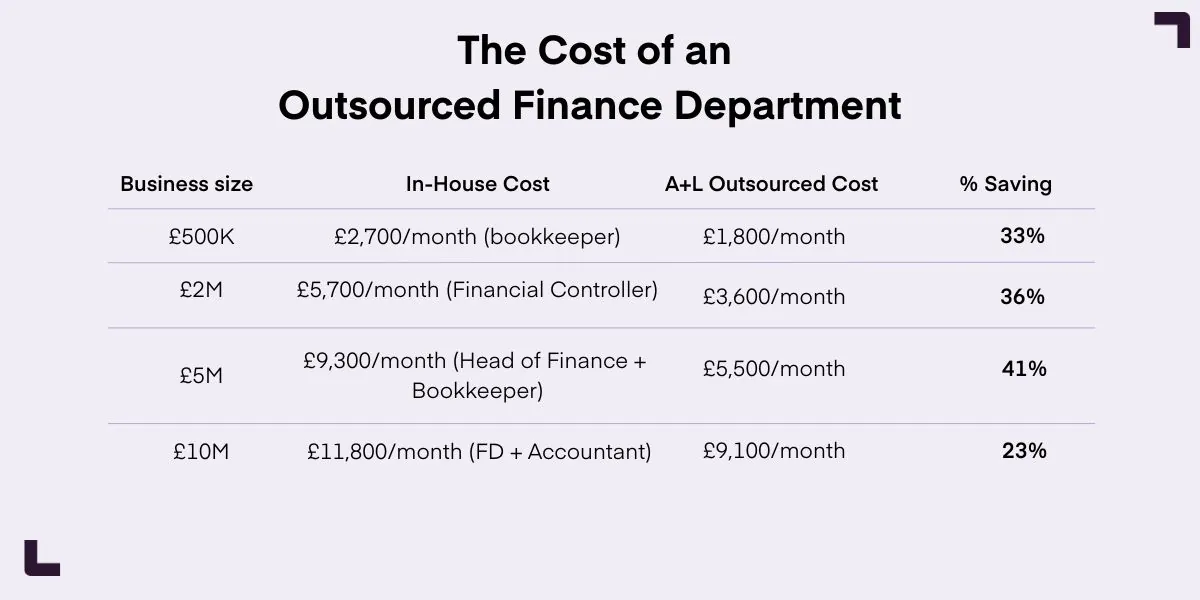
In-House vs Outsourced Finance: What’s the Real Cost for Your Business?
17 Sep 2025The business world is changing. More companies are now looking to outsourcers in an attempt to reduce costs and improve efficiencies. Accounting and finance is no exception. We work with a host of businesses as their fully outsourced finance department, and it comes with lots of unique benefits.
In this article, we’ll be exploring the difference in cost between an Outsourced Finance Department and hiring internally, along with the varying costs depending on what level of service you require.
So without further ado, let’s get into it.
How Much Would It Cost to Hire Internally?
This all depends on the level of support you require from someone internally and what their job role will cover. Let’s have a look at some of the salaries for job roles that typically make up an in-house finance team. The figures below refer to the UK-wide averages, but it’s also important to keep in mind that salaries in London and the Southeast of England can be anywhere from 10% to 25% higher than the UK average.
Financial Manager
A finance manager typically looks after a company’s financial operations, covering everything from budgeting, forecasting financial reporting, tax planning, along with working with the Senior team to support the long-term plans of the business.
The typical salary for a finance manager in the UK ranges from £35,000 to £95,000, depending on experience.
Once you consider National Insurance and Pension Contributions on top of that, it will typically cost you as an employer between £3,441 and £9,341 a month.
Finance Director
A Finance Director usually sits at the top of a business’s finance team and is responsible for managing and directing the company’s financial performance. Their role includes everything from budget creation, cashflow management, financial forecasting and risk assessment. They will also be responsible for managing the team underneath them, which, depending on the business’s size and complexity, may vary itself in size too. This is also what separates the role of a Financial Manager and a Financial Director. The best way to describe this would be using a national gym chain as an example.
In this scenario, let’s say the fictional business Gym Company has commercial gyms all around the UK. You might have a Financial Manager who looks after a certain region like the North West. Underneath them, they might have a team of bookkeepers, a credit controller and maybe a purchase ledger clerk. You could have multiple people in these positions too.
They would all report to the Finance Manager, who would then report to the Finance Director and provide direction and assess the company’s performance as a whole.
Typically in the UK, a Finance Director or Head of Finance could command a salary anywhere between £95,000 and £130,000 on average, but the sky is the limit really, and this figure may increase dramatically depending on the size of the business.
So, a Financial Manager and a Finance Director or Head of Finance are at the top end of salary requirements, but what other roles may typically be found in a finance team?
Bookkeeper
The job of a bookkeeper is to keep the businesses financial records up to date by managing accounts payable and receivable, reconciling bank accounts and preparing financial statements like profit and loss reports. A big part of the job is using cloud accounting software such as Xero and Sage to ensure financial accuracy and help with tax filings. The bookkeeper is the one who makes sure all the data is correct so that business decisions can be made off the back of it. Depending on the size of the businesses, you might have a team of bookkeepers, or for smaller businesses, you might just have one. Or in the worst case scenario you might have Managing Director or Owner who does all the bookkeeping (but we’ll get onto that later!).
For a bookkeeper, the salary can be anywhere between £18,000-£25,000 a year for an entry level role, through to £30,000 to £40,000 a year for a more senior role with more experience. This means that to the employer, for one bookkeeper, it can cost anywhere between £1170 a month to £3,933 a month, depending on experience.
Credit Controller
A credit controller plays a crucial role in maintaining a business’s cash flow. Their primary responsibility is making sure customers pay their invoices on time and managing any overdue accounts. This often involves sending reminders, making phone calls, and sometimes liaising with solicitors or debt collection agencies if payments are delayed.
In addition to chasing outstanding invoices, a credit controller may also be responsible for setting credit limits, evaluating new customer applications, and keeping track of payment terms. In short, they help protect the business from bad debt and ensure a steady flow of cash coming in.
The average salary for a credit controller in the UK is typically between £25,000 and £35,000, depending on experience and the complexity of the customer base. Once you add employer National Insurance and pension contributions, the monthly cost to the business can range from £2,500 to £3,600 per month.
Sales Ledger Clerk
A sales ledger clerk handles the invoicing side of the finance team. Their job is to raise invoices, allocate incoming payments against customer accounts, and ensure that the sales ledger is kept up to date. Accuracy is critical here, as any mistakes can throw off cash flow forecasts and aged debtor reports.
In some businesses, the role may also include generating credit notes, managing customer queries about their accounts, and providing aged debtor reports to senior managers. While the role may sound administrative, it’s an essential part of maintaining financial hygiene.
Salaries for sales ledger clerks in the UK generally fall between £23,000 and £30,000 a year, depending on industry and location. When employer costs are factored in, businesses should expect to pay £2,261 to £2,950 per month to bring this role in-house.
How much could a finance team cost at different sizes?
As mentioned earlier, the size and complexity of every business varies, and as a result, so too does the size of the finance team. Having worked with hundreds of businesses over the years, we’ve seen our fair share of finance teams (or lack of). So, with that in mind we’ve estimated figures based on the typical finance teams we see, from basic to fully fledged.
Basic Set Up
Often the chosen set up for early-stage businesses where the Managing Director or Founder still handles the majority of the financial matters.
- Bookkeeper: £2,300 to £3,200 per month
- Total Cost: £2,300 to £3,200 per month
Mid-Level
Often a business may outgrow the basic set up they’ll bring in a dedicated Finance Manager to handle the higher-level finance elements with a bookkeeper ticking away in the background.
- Finance Manager: £3,400 to £9,300 per month
- Bookkeeper: £2,300 to £3,200 per month
- Total cost: £5,900 to £12,500 per month
Growing Team
As a business grows often the finance needs become more complex, and the introduction of a credit controller may reflect a greater need for chasing payments if there a large number of transactions and invoices to deal with.
- Finance Manager: £3,400 to £9,300 per month
- Bookkeeper: £2,300 to £3,200 per month
- Credit Controller: £2,500 to £3,600 per month
- Total cost: £8,200 to £16,100 per month
Full In-house Team
For larger businesses where the finance needs are more complicated, you may see a team that resembles the below, or you may find several employees in the same role.
- Finance Director: £7,900 to £13,100 per month
- Finance Manager: £3,400 to £9,300 per month
- Bookkeeper: £2,300 to £3,200 per month
- Credit Controller: £2,500 to £3,600 per month
- Sales Ledger Clerk: £2,300 to £3,100 per month
- Total cost: £18,400 to £32,300 per month
So as is clear from the above, the setup can vary vastly. For very large businesses, they will likely have multiple people in multiple roles, for example multiple Finance Managers reporting to a Finance Director. Or you may see multiple bookkeepers or credit controllers. The point is, there isn’t a single template set up, and each business will be different, but the cost can be extremely off-putting and can be anywhere from a couple of thousand a month to multiple tens of thousands.
The Hidden Cost of DIY Finance
Over the years we’ve seen our fair share of owners wearing multiple hats and trying to be bookkeepers, credit controllers, finance managers alongside all the roles and responsibilities that are involved in running the business. And yes, of course, we understand the prerogative to save money, but handling your finances yourself is often a false economy. What seems like a way to save money is often costing you way more than should. Let’s say as an owner you’re earning £100,000 and spending ten hours a week doing bookkeeping and chasing invoices. You’re effectively paying £100+ an hour to pay yourself to do work that could be outsourced for a fraction of the cost. Not only that, but you’re also losing ten hours a week that could be spent on the important stuff like growing the business, winning clients, creating strategy or improving operations. The true cost isn’t just the salary, it’s also the lost potential of what they could’ve done with that time instead.
How much does an Outsourced Finance Department Cost?
As we keep mentioning, costs always depend on the size and complexity of your business, but we’re confident that the savings you’ll make from outsourcing will be significant. At A+L, we won’t sell you a fully-fledged, all-singing and all-dancing finance function if you don’t need it. We tailor our outsourced finance services to meet the needs of each client.
Let’s back that up with some figures.
Businesses Turning Over up to £500K
If you’re an early-stage business or you’re turning over around £500,000, a basic financial requirement might be basic bookkeeping, VAT returns and day-to-day payment processing. A part-time bookkeeper alone could cost £2,700 a month let’s say, but to outsource all of the above, it would typically cost around £1,800 a month saving 33%.
Businesses Turning Over £2 million
As you grow, you’re finance function will too. A business with £2m revenue will typically require management accounts, cashflow forecasting, bookkeeping and credit control. If you were to hire a Financial Controller, this could cost you around £5,700 per month, including salary and employer costs. If you were to outsource to Accounts and Legal, we could provide the same level of support and output for around £3,600 a month, delivering a 36% saving.
Businesses Turning Over £5 million
When you get to the £5m mark, your finance function will likely require a more senior set up, often with the introduction of a Head of Finance. Let’s say a Head of Finance and a Bookkeeper make up your team, internally, this would cost you £9,300 a month, but outsourced you’d be paying approximately £5,500 a month saving you 41%. This would include all the same functionality and depth, covering everything from forecasting, analysis, tax planning, managing supplier payments, credit control and payroll.
Businesses Turning Over £10 million
Even when you get to the £10m mark, where a business may need both a Finance Director and a Company Accountant to handle everything from investor reporting, cashflow planning, compliance (e.g. EIS, EMI), and complex budgeting; outsourcing still proves more cost-effective. At this level, an in-house team could end up costing you £11,800 a month, while at Accounts and Legal our outsourced finance function would provide an equivalent service for £9,100 a month, representing a saving of 23%. Importantly, this covers a team of specialists covering everything from strategic oversight to day-to-day execution, with no additional cost for holiday cover, sickness, or performance management.
The Key Takeaways: In-house vs Outsourced Finance Function
Building your finance function is one of the most important decisions a growing business can make, but handled incorrectly, it can also be unnecessarily expensive. It requires everything from bookkeepers and credit controllers through to finance managers and directors. Internal hires for these roles can come at a price, not to mention the hidden costs of recruitment, any absences, and lost time along the way.
From our experience, outsourced finance offers flexibility and scalability, without losing any of the insights, control or quality. Whether you’re a lean start-up doing everything yourself, or a growing SME looking to replace or upgrade your current setup, outsourcing can reduce monthly costs by up to 40% compared to building an in-house team.
More importantly, it gives business owners back their valuable time to focus on the stuff that matters, like strategic planning, winning business and steering the ship. It also gives you the vital tools and information to make real-time decisions based on your company’s data.
If you’re ready to explore whether an outsourced finance function could work for your business, we’d love to chat.
Read More: Financial Outsourcing: A Full Guide for SME Owners in the UK
























